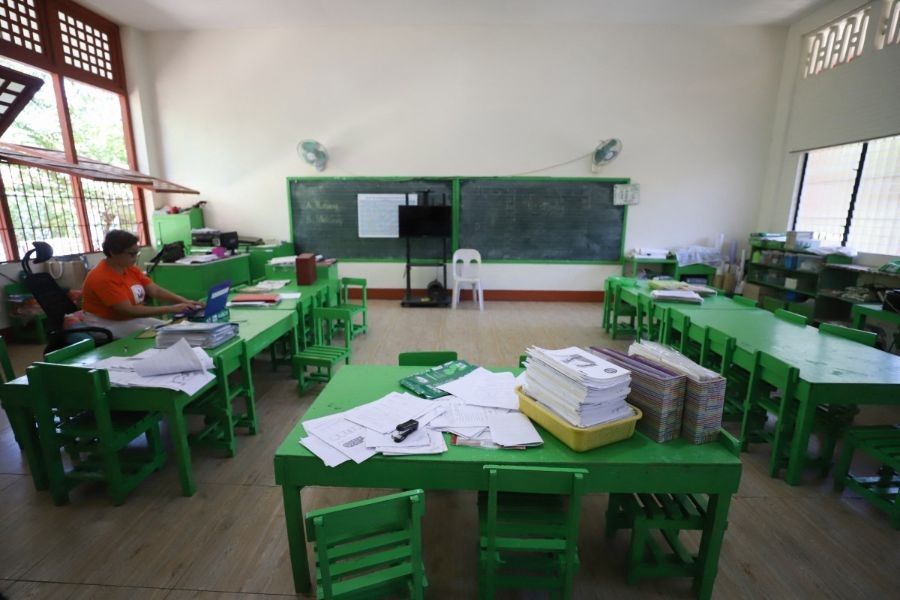COA: DepEd spent P1 billion on unusable digital system

MANILA, Philippines — The Department of Education paid P1.064 billion for an unusable digital infrastructure project, with state auditors criticizing the department for continuing payments even after key components of the system remained undelivered, according to the Commission on Audit's 2023 report.
COA found that DepEd paid out the billion-peso sum — over 78% of the project's P1.356-billion total cost — to a contractor with a questionable financial capacity and a record of delayed projects. The department proceeded with payments despite receiving no working system that could streamline its payroll, inventory, and financial records as promised.
The project, called the DepEd Enterprise Resource Planning System (DERPS), was meant to automate and connect all the department's systems so that data would be available "at the click of a button."
Instead, state auditors said the project, under then-DepEd Secretary Leonor Briones, resulted in a "wastage of public funds" as none of the promised services were delivered despite the payments made.
The failed implementation has left DepEd still manually processing its payroll, procurement, and financial records — tasks DERPS was meant to automate. COA's findings also show DepEd incurred additional costs. These include P22.6 million in extra maintenance fees and P9.06 million worth of unused computer equipment gathering dust in one regional office.
Red flags
According to the annual audit report, COA flagged nearly every facet of the procurement process for the DERPS project, the second phase of which was procured directly by the department in 2019. (No date was stated for the procurement of the first phase.)
State auditors questioned DepEd for awarding the P697-million contract for Phase II to a joint venture despite one party having only P92.5 million in net worth. The flagged contractor also had a documented history of delays in the majority of its ongoing projects.
Specifically, COA considered it irregular that "Contractor Party I" was able to bag the project with a net worth that is "substantially less than its share and interest in the project, with equivalent cost of P690 million."
"Its seemingly financial incapability, considering that the latter will utilize all its resources in the project, create doubts as to whether the contractor will be able to sustain all its deliverables as stated in the approved contract, and deliver the same on time," the audit report read.
State auditors found that, as of December 2019, "Contracting Party I" had at least six delayed projects with various government agencies, including DepEd and the Office of the Vice President. It also had five delayed projects with private companies. Other contracts' status were undetermined.
The status of these ongoing contracts should have been reviewed by DepEd, and "any deficiencies found therein should had been a ground for disqualification," COA said.
"The awarding of the P700 million project to the winning bidder creates doubts as to the competency of the DepEd officials/personnel involved in the procurement process which is apparent in the lackluster review of the relevant documents submitted by the winning bidder," COA said.
State auditors added that DepEd's failure to spot the financial incapability and the capacity of the contractor to deliver the project's milestones on time had placed "the government at a disadvantage."
As a response to state auditors' observations, DepEd explained that the contractors for DERPS had satisfied the financial capacity requirement of the government's procurement laws. "Contracting Party I" had submitted a line of credit to prove its financial capacity, according to DepEd.
However, state auditors believe this was insufficient. "We maintain our stance that the Department should have conducted a thorough validation considering the indicative financial incapability of the winning bidder / minimal net worth," COA said.
"It is stressed that the management has the duty to diligently review the financial capacity of the bidder to sustain the project’s implementation in order not to put public funds at risk for possible wastage," state auditors said.
Poor planning
State auditors found that DepEd split the procurement into phases when it could have been integrated into a single process. The department also proceeded with implementing later phases despite knowing Phase I — handled by the Department of Budget and Management's (DBM) procurement service — was incomplete.
Based on interviews with DepEd, COA said the first phase of the project concerned the procurement of the module or software system. The second phase dealt with the installation and configuration of the subject modules created in the first phase, along with the delivery of the hardware components.
"The implementation of DERPS is dependent upon the successful completion of each phase of the procurement project. Simply put, the initial phase (DERPS Phase I) has to be completed first before Phase 2 can be started/implemented," COA explained.
State auditors found it problematic that DepEd gave DBM's procurement service the responsibility of implementing the first phase of the project even as it had no technical expertise to do so. Based on government laws on procurement, DBM's procurement service is responsible only for procuring commonly used supplies, materials and equipment.
In the end, DepEd decided to "partially terminate the remaining undelivered milestones" of the first phase of DERPS. This is because the undelivered milestones had already piled up to at least 10% of the liquidated damages threshold — a sufficient ground for the termination of the contract.
However, according to state auditors, despite major delays in implementation, DepEd did not proceed with collecting the liquidated damages, according to the COA report.
Upfront, continuing payments
DepEd had also paid the entire Phase I contract price of P358.93 million upfront, contrary to the agreed payment terms, the COA report added.
"The transfer of funds at the start of the project is not in consonance with the terms stipulated in the covering contract that [the procurement service] shall bill the Department for the actual goods received on a quarterly basis and in accordance with the billing statement issued by the contractor or consultant," state auditors said.
State auditors also found that even if the first phase was never completed, DepEd continued paying the contractors for the completion of other advanced project milestones that could not have proceeded without the first phase.
For instance, state auditors found that DepEd paid the contractors for two milestones related to "Change Management" and "Delivery of HRIS" — tagged as milestones 5 and 6 — even as the software in the first phase was not delivered. This also means milestone 4 (deployment of DERPS I module) was skipped altogether.
State auditors also found instances where Certificates of Completion and Acceptance were issued despite non-delivery of project milestones. These were issued by the office of former DepEd Undersecretary for Administration Alain Pascua, who occupied the post from 2016 to 2023.
Pascua was one of several DepEd officials suspended over the procurement of overpriced laptops for teachers.
"The foregoing conditions create doubt as to the regularity of the transactions and may be considered as gross neglect of duties for failure to give proper attention to such important details and is characterized by lack of care in safeguarding the public funds," the audit report stated.
COA recommended that DepEd investigate those involved in the project's implementation for possible gross neglect of duties that led to the improper disposition of public funds.
Waste of funds
The failed project has left tangible evidence of waste. In DepEd's regional office in Eastern Visayas (Region 8), computer equipment worth P9.06 million received from the central office in 2021 remains unused to this day. This is because the actual software for the DERPS was never completed.
In addition, COA flagged DepEd for proceeding to pay P290 million to the joint venture for a related project called the "Core Network and Managed Co-Location Facilities" even as DERPS remained unfinished. This co-location project was meant to "provide connectivity" in relation to DERPS.
As a result, the department incurred P22.6 million in additional costs for maintaining co-location services after the contract expired in October 2023.
DepEd's explanation
DepEd explained that it conducted the second phase "almost simultaneously" with the first phase, which was why it proceeded with payments for Phase II and the co-location facilities even as Phase I was incomplete.
The explanation did not satisfy the state auditors, who said that DepEd had skipped a key milestone and rendered payments anyway.
As a result, the "inefficient and ineffective contract implementation of the DERPS Interrelated projects is tantamount to the wastage of government funds," according to COA.
- Latest
- Trending






























